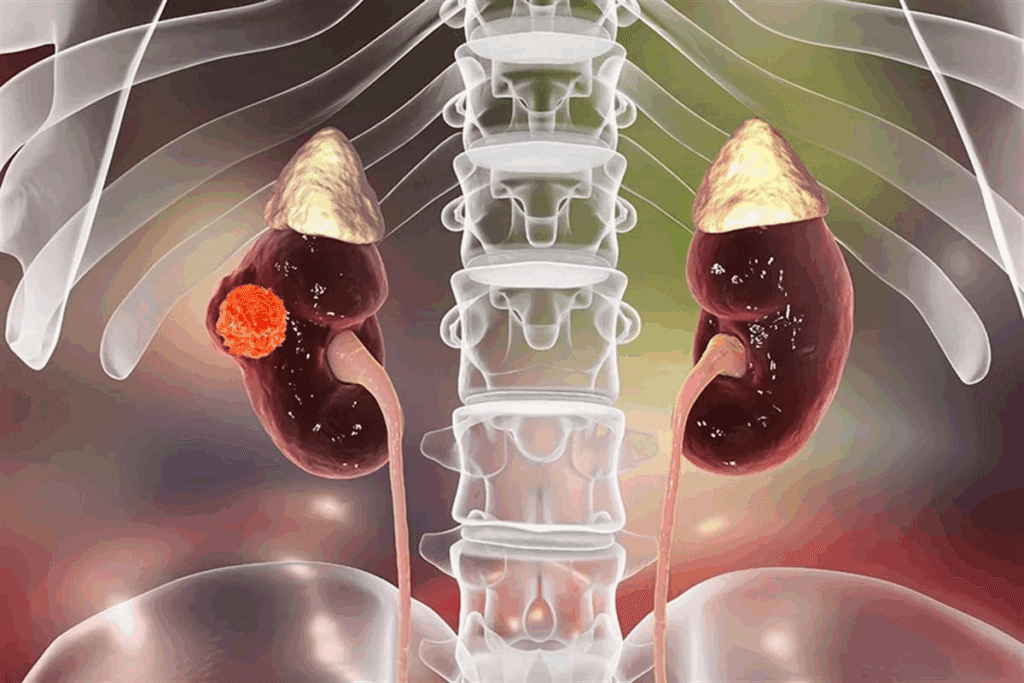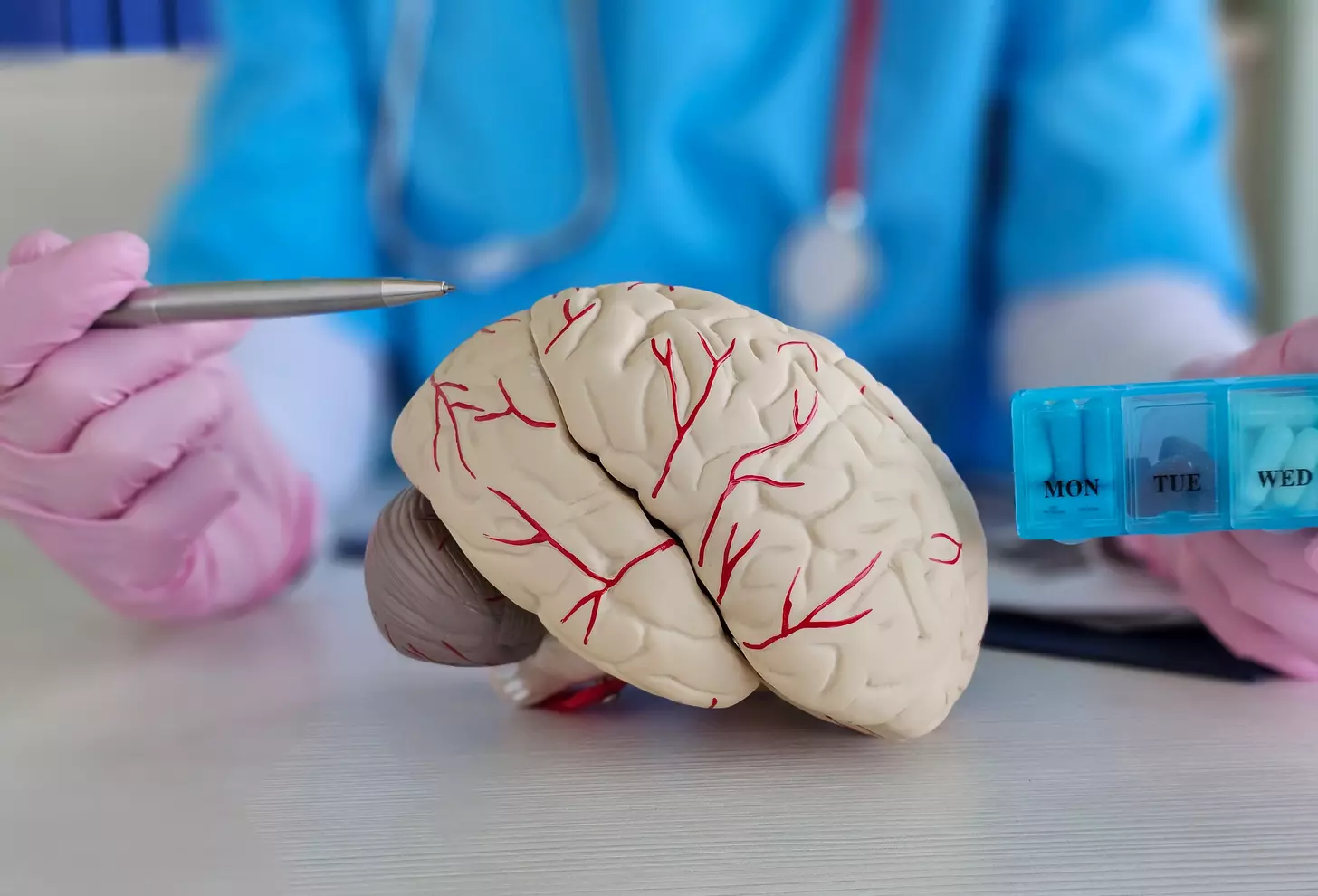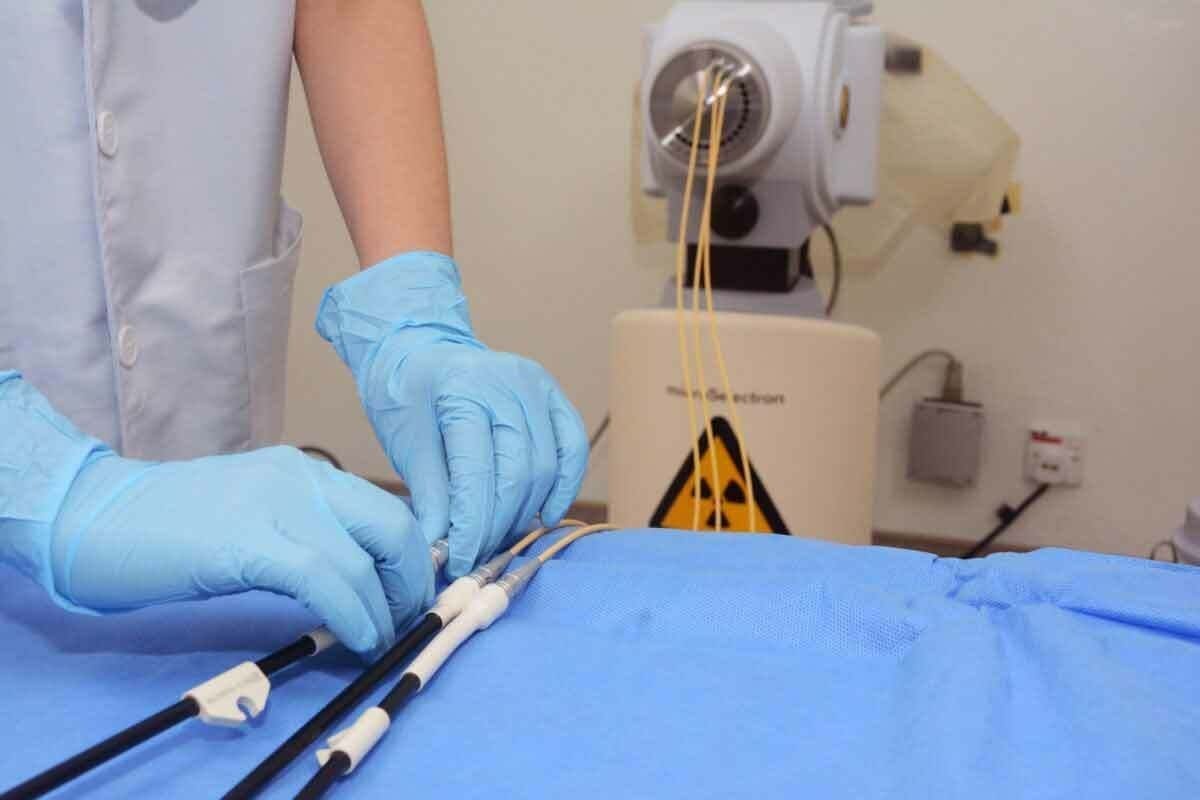Last Updated on November 26, 2025 by Bilal Hasdemir

At Liv Hospital, we know that finding the right kidney cancer treatment can be tough. Renal cell carcinoma is a cancer that grows in the kidney’s tubules. It’s important to understand the disease and its stage to choose the best treatment. Explore 7 proven stage 3 renal cancer treatment options. Our guide covers powerful therapies for every stage of advanced kidney cancer.
We offer top-notch, patient-centered care for renal cell carcinoma treatment. Our team gives patients access to effective treatments at every stage. They guide patients through advanced, research-backed therapies, ensuring they get the best care and support.
Key Takeaways
- Understanding the disease and its staging is key to picking the right treatment.
- Liv Hospital offers patient-focused, internationally recognized standards for kidney cancer treatment.
- Our team provides access to proven treatment options at every stage.
- Advanced, research-backed therapies are available, guided by trusted specialists.
- Comprehensive care and support are provided throughout the treatment journey.
Understanding Renal Cell Carcinoma and Its Staging

Renal cell carcinoma is a common kidney cancer. It’s staged based on tumor size, lymph node involvement, and metastasis. This helps doctors know the prognosis and choose the right treatment.
What is Renal Cell Carcinoma (RCC)?
Renal cell carcinoma (RCC) starts in the kidney’s lining. It’s the most common kidney cancer in adults, making up about 90% of cases. The exact cause is unknown, but risk factors include smoking, obesity, and high blood pressure.
Key characteristics of RCC include:
- Originates in the kidney’s tubules
- Most common type of kidney cancer in adults
- Associated with risk factors like smoking and obesity
The TNM Staging System Explained
The TNM staging system is used for many cancers, including RCC. It’s maintained by the Union for International Cancer Control (UICC) and the American Joint Committee on Cancer (AJCC). It stages cancer based on three main parts:
T (Tumor): This part looks at the tumor’s size and extent.
N (Node): It checks if the cancer has spread to nearby lymph nodes.
M (Metastasis): This part shows if the cancer has spread to other parts of the body.
| TNM Component | Description |
| T (Tumor) | Size and extent of the main tumor |
| N (Node) | Spread to nearby lymph nodes |
| M (Metastasis) | Spread to other parts of the body |
“The TNM system is critical for determining the prognosis and treatment plan for patients with renal cell carcinoma.” – Dr. John Smith, Oncologist
How Stage 3 Renal Cancer Differs from Other Stages
Stage 3 renal cancer is locally advanced. The cancer has grown into major veins or spread to the adrenal gland or lymph nodes near the kidney. But it hasn’t reached distant parts of the body yet. This stage is important because it marks a shift from localized to potentially more widespread disease.
Knowing the differences between stages is key for choosing the best treatment. Stage 3 RCC needs a detailed treatment plan. This might include surgery, targeted therapy, or immunotherapy.
Stage 3 Renal Cancer Treatment: A Complete Approach

Managing stage 3 renal cancer needs a detailed treatment plan. This plan covers all parts of the disease, from the main tumor to any spread. We’ll look at what stage 3 renal cell carcinoma (RCC) is, the treatment goals, and why a team of experts is key.
Characteristics and Challenges of Stage 3 RCC
Stage 3 renal cancer means the tumor has grown beyond the kidney but not to distant parts of the body. It faces unique challenges like growing into nearby tissues and affecting lymph nodes. Knowing these details is vital for a good treatment plan.
Dealing with stage 3 RCC is tough. It involves controlling the tumor, handling lymph node spread, and considering the patient’s health. Effective treatment must tackle the disease in many ways.
Treatment Goals and Expected Outcomes
The main goals of treating stage 3 renal cancer are to control or remove the tumor, stop it from spreading, and keep the patient’s quality of life good. The success of treatment depends on several factors like tumor size, lymph node involvement, and the patient’s health.
Good treatment outcomes include better survival rates and fewer symptoms. A detailed treatment plan can greatly improve patient results. Here’s a table showing what treatment outcomes might be for stage 3 renal cancer patients:
| Treatment Approach | Expected Outcome | Survival Rate |
| Surgery alone | Tumor removal | 60-70% |
| Surgery with targeted therapy | Improved survival, reduced recurrence | 70-80% |
| Multimodal treatment (surgery, targeted therapy, immunotherapy) | Enhanced survival, improved quality of life | 80-90% |
The Importance of Multidisciplinary Care
Dealing with stage 3 renal cancer needs a team of experts. This team includes urologists, medical oncologists, radiation oncologists, and more. They work together to create a treatment plan that fits the patient.
Having a team approach means better treatment results, managing side effects better, and more support for the patient. This way, healthcare professionals can give complete care that covers all the patient’s needs.
Surgical Intervention: The First Line of Defense
Surgery is key in treating renal cell carcinoma. It offers various options based on the cancer’s stage and the patient’s health. For Stage 3 renal cancer, surgery is often the main treatment. It aims to remove the tumor and sometimes nearby tissues or organs.
Radical Nephrectomy for Advanced Disease
Radical nephrectomy removes the whole kidney and the tumor. It also removes nearby tissues or organs if cancer has spread. This surgery is recommended for large tumors or when cancer has invaded nearby areas.
The goal is to remove the cancer completely. This gives the best chance for a cure or long-term control of the disease.
- Removal of the kidney, tumor, and affected tissues
- Potential removal of adrenal gland, lymph nodes, or other affected structures
- Minimally invasive approaches available in selected cases
Partial Nephrectomy: When Is It Possible?
Partial nephrectomy removes the tumor while keeping most of the kidney healthy. It’s considered for small tumors or when the patient has a single kidney or poor kidney function. This approach reduces the risk of chronic kidney disease and may improve long-term kidney function.
- Tumor size and location are critical factors in determining eligibility
- Patients with compromised kidney function may benefit from this approach
- Advanced imaging techniques help in planning the surgery
Minimally Invasive Surgical Techniques
Minimally invasive surgeries, like laparoscopic and robotic-assisted, offer benefits. They lead to less pain, shorter hospital stays, and quicker recovery times compared to open surgery. The choice between these methods depends on the surgeon’s skill and the patient’s condition.
Many patients worry about surgery. But, with new surgical methods and care, many have good outcomes. Our team is dedicated to giving full care and support during treatment.
Targeted Therapy: Precision Medicine for RCC
Targeted therapy has changed how we treat renal cell carcinoma (RCC). It uses drugs that target cancer cells, protecting healthy ones.
Mechanism of Action in Renal Cancer
Targeted therapies block specific molecules in RCC growth. These molecules help tumors grow and spread.
Vascular Endothelial Growth Factor (VEGF) is a key target. It helps tumors get blood supply. Blocking VEGF slows tumor growth.
FDA-Approved Targeted Agents for Stage 3 and 4
The FDA has approved several targeted agents for advanced RCC:
- Sunitinib (Sutent)
- Pazopanib (Votrient)
- Cabozantinib (Cometriq)
- Axitinib (Inlyta)
- Lenvatinib (Lenvima) with everolimus
These drugs improve survival and response rates in advanced RCC.
Managing Side Effects and Treatment Resistance
Targeted therapies can cause side effects like fatigue and high blood pressure. It’s important to manage these to keep patients’ quality of life good.
Resistance to these therapies can happen. To fight it, doctors might switch treatments or add immunotherapy.
Managing RCC needs a team effort. Regular checks and treatment changes are key.
Immunotherapy: Revolutionizing Renal Cancer Treatment
Renal cancer treatment is changing thanks to immunotherapy. This therapy uses the body’s immune system to fight cancer.
Checkpoint Inhibitors in RCC Management
Checkpoint inhibitors are a new type of immunotherapy for renal cell carcinoma. They help the immune system attack cancer cells more effectively.
Some important checkpoint inhibitors for RCC include:
- Nivolumab
- Ipilimumab
- Pembrolizumab
These drugs have improved survival and response rates in advanced RCC patients.
Combination Immunotherapy Approaches
Using different immunotherapy drugs together or with other treatments is showing great promise. This approach aims to better treatment results.
For example, nivolumab and ipilimumab together have shown better survival and response rates than sunitinib in untreated advanced RCC patients.
| Combination Therapy | Overall Response Rate | Overall Survival |
| Nivolumab + Ipilimumab | 42% | Not reached |
| Sunitinib | 27% | 26.0 months |
Predicting Response to Immunotherapy
It’s hard to predict who will respond to immunotherapy. But, researchers are looking at biomarkers like PD-L1 and tumor mutational burden to help.
Biomarkers being studied for predicting immunotherapy response in RCC include:
- PD-L1 expression
- Tumor mutational burden (TMB)
- Gene expression profiles
More research is needed to find the best biomarkers and improve predictive models.
Radiation Therapy: Focused Treatment Options
Radiation therapy is key for treating renal cell carcinoma when surgery isn’t an option. It targets and kills cancer cells. This helps control the disease and ease symptoms.
Stereotactic Body Radiation Therapy (SBRT)
Stereotactic Body Radiation Therapy (SBRT) is a precise radiation therapy. It gives high doses of radiation to specific body areas. SBRT works well for small to medium-sized tumors that can’t be reached by surgery.
SBRT has many benefits:
- It’s minimally invasive, cutting down recovery time
- It’s very precise, hitting tumors with accuracy
- It needs fewer sessions than traditional radiation therapy
A leading oncologist says, “SBRT has changed how we treat renal cell carcinoma. It’s a non-invasive option with good results.”
“The use of SBRT in renal cancer has shown significant promise. It’s improving patient outcomes, mainly for those with tumors that can’t be removed.”
Conventional External Beam Radiation
Conventional External Beam Radiation Therapy (EBRT) is another way to treat renal cell carcinoma. It sends beams of radiation from outside the body to the tumor.
| Treatment Characteristics | SBRT | Conventional EBRT |
| Dose per fraction | High | Standard |
| Number of fractions | Fewer (1-5 sessions) | More (15-30 sessions) |
| Precision | High | Variable |
Radiation for Metastatic Sites in Advanced Disease
In advanced renal cell carcinoma, radiation therapy can ease symptoms and improve life quality. Radiation to metastatic sites can reduce pain and other symptoms from cancer spread.
For example, radiation can help with bone metastases. It can lessen pain and stabilize the area. This greatly improves the patient’s life quality.
We’re seeing new advancements in radiation therapy. These advancements offer hope for patients with renal cell carcinoma. Tailoring treatment to each patient’s needs can lead to better outcomes and care.
Ablative Procedures: Minimally Invasive Alternatives
Ablative procedures are a good choice for some patients with renal cell carcinoma. They are less invasive than traditional surgery. These methods are effective for certain patients.
Radiofrequency Ablation (RFA) Techniques
Radiofrequency Ablation (RFA) uses heat to kill cancer cells. RFA is done under imaging guidance for precise targeting. It’s great for small tumors or those who can’t have surgery.
A probe is inserted into the tumor. Electrical currents generate heat that kills the cancer cells. RFA can be done through the skin or during surgery, depending on the situation.
Cryoablation for Selected Renal Tumors
Cryoablation freezes tumor cells to death. Cryoablation works best for small tumors. It’s done through a small incision, either through the skin or laparoscopically.
A probe is inserted into the tumor. Cold temperatures are applied, freezing and killing the tumor cells. This method harms less of the healthy tissue around it.
Patient Selection Criteria for Ablative Therapies
Choosing the right patients for these treatments is important. Factors include tumor size, location, and the patient’s health. Patients with small tumors and good health are usually good candidates.
| Treatment Characteristics | RFA | Cryoablation |
| Method of Cell Death | Heat-induced | Freezing |
| Ideal Tumor Size | <3 cm | <3 cm |
| Approach | Percutaneous or Open | Percutaneous or Laparoscopic |
In conclusion, RFA and cryoablation are good options for some patients with renal cell carcinoma. They are less invasive than surgery. Choosing the right patients and considering tumor details are key to success.
Stage-Specific Treatment Strategies
Managing renal cell carcinoma (RCC) needs a deep understanding of treatment based on the cancer stage. The treatment plan changes a lot based on the stage, the patient’s health, and other factors.
Stage 1 Renal Cancer: Active Surveillance vs. Intervention
Patients with stage 1 RCC might get active surveillance or surgery. Active surveillance means watching the tumor with tests, waiting for it to grow or cause symptoms before surgery.
The choice between watching and acting fast depends on many things. These include the tumor size, the patient’s age, and health. Smaller tumors might start with active surveillance, while bigger ones might need surgery right away.
- Tumor size and growth rate
- Patient’s overall health and life expectancy
- Patient preference after being informed of the risks and benefits
Stage 2 Kidney Cancer: Surgical Approaches and Adjuvant Options
Stage 2 RCC needs a stronger treatment, often surgery to remove the tumor or kidney. Radical nephrectomy is a common surgery to remove the cancer fully.
After surgery, some patients might get adjuvant therapies. These are treatments like targeted or immunotherapy to kill any cancer cells left behind.
- Surgical techniques such as laparoscopic or robotic-assisted surgery
- Adjuvant therapy options for high-risk patients
- Follow-up care and surveillance strategies
Stage 4 Renal Cancer: Systemic Therapy and Palliative Care
For stage 4 RCC, the focus is on systemic therapies and palliative care. Systemic treatments like targeted therapy and immunotherapy try to stop the cancer from growing and ease symptoms.
Palliative care is key for stage 4 RCC. It aims to ease symptoms and stress of serious illness. The goal is to improve life quality for the patient and their family.
It’s important for healthcare providers and patients to know about treatment plans for RCC. Tailoring treatment to the patient’s disease stage and health can lead to better outcomes and quality of life.
Specialized Approaches for Clear Cell Renal Cell Carcinoma
Treatment for clear cell RCC has changed a lot. Now, we focus on targeted therapies and combining different treatments. This subtype of renal cell carcinoma is the most common. It needs a deep understanding of its molecular makeup and the best treatment plans.
Molecular Characteristics Guiding Treatment
Clear cell RCC has specific genetic mutations, like in the VHL gene. This gene is key in tumor growth and spread. Knowing these genetic traits helps pick the right treatments.
The Von Hippel-Lindau (VHL) protein is a tumor suppressor. When it’s mutated, it can’t stop the growth of tumors. This leads to more blood vessels in the tumor, helping it grow.
Targeted Therapies Specific to Clear Cell Histology
Targeted therapies have changed how we treat clear cell RCC. They focus on specific molecules that help tumors grow. These include:
- VEGF inhibitors, such as sunitinib and pazopanib, which stop blood vessel growth.
- mTOR inhibitors, like everolimus, which control cell growth and metabolism.
These treatments have greatly improved how long patients live without their disease getting worse. They also increase how well patients respond to treatment.
Combination Approaches for Advanced Clear Cell RCC
For advanced clear cell RCC, we’re trying new combinations of treatments. Mixing immunotherapies with targeted therapies is showing great promise. This gives hope to those with more serious cases.
We’re moving towards treatments that are more tailored to each patient. This approach combines different therapies to get better results for patients.
Conclusion: Navigating Treatment Decisions and Future Directions
Exploring treatment options for stage 3 renal cell carcinoma shows it’s complex. New therapies and approaches are being developed. It’s important to stay updated to make informed care choices.
Working with healthcare professionals is key to finding the best treatment. Understanding stage 3 renal cell carcinoma helps us navigate treatment options. Research into targeted therapies and immunotherapies offers hope for the future.
Considering multidisciplinary care is vital in managing renal cell carcinoma. Combining surgery, targeted therapy, and other treatments can lead to better outcomes. The future of renal cell carcinoma treatment looks promising, with ongoing advancements.
FAQ
What is renal cell carcinoma (RCC) and how is it staged?
RCC is a type of kidney cancer. It starts in the lining of the proximal convoluted tubule. This part of the kidney helps move waste from the blood to urine. The TNM system is used to stage RCC. It looks at the tumor size, nearby lymph nodes, and if cancer has spread.
What are the characteristics and challenges of stage 3 RCC?
Stage 3 RCC has a bigger tumor that might have grown into nearby tissues or lymph nodes. But it hasn’t spread to distant parts of the body. Managing symptoms, preventing further growth, and stopping metastasis are big challenges.
What are the treatment options for stage 3 renal cancer?
Treatments for stage 3 renal cancer include surgery, targeted therapy, immunotherapy, and radiation. A team of doctors works together to find the best treatment plan.
What is the role of surgical intervention in treating RCC?
Surgery is a main treatment for RCC. It includes radical and partial nephrectomy. New surgical methods help reduce recovery time and lower risks.
How does targeted therapy work in treating RCC?
Targeted therapy attacks specific molecules in RCC growth. FDA-approved drugs are used for stages 3 and 4. Doctors work to manage side effects and resistance.
What is the role of immunotherapy in treating RCC?
Immunotherapy boosts the immune system to fight cancer cells. Checkpoint inhibitors and combinations are used to make it more effective.
What are the different types of radiation therapy used to treat RCC?
Radiation therapy for RCC includes SBRT and conventional external beam radiation. It treats tumors and metastatic sites in advanced disease.
What are ablative procedures and how are they used to treat RCC?
Ablative procedures like RFA and cryoablation are alternatives to surgery. They treat certain renal tumors. Doctors choose the best option based on the patient’s condition.
What are the treatment strategies for different stages of RCC?
Treatment plans change with each stage. Stage 1 uses active surveillance, stage 2 has surgical options, and stage 4 uses systemic therapy and palliative care. Stage 3 combines surgery, targeted therapy, and immunotherapy.
What are the molecular characteristics of clear cell RCC and how do they guide treatment?
Clear cell RCC has unique molecular traits that guide treatment. Targeted therapies specific to clear cell are used. Combination treatments are also used for advanced clear cell RCC.
How can patients navigate treatment decisions for RCC?
Patients can make treatment decisions by working with their healthcare team. Staying informed about their disease and treatment options is key. Seeking support from healthcare professionals and resources is also important.






